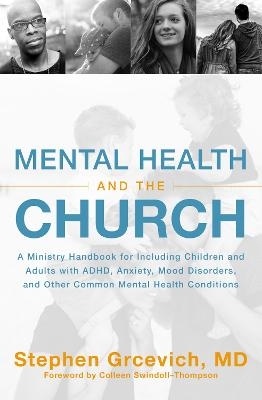
Mental Health and the Church
Zondervan (Verlag)
978-0-310-53481-5 (ISBN)
The church across North America has struggled to minister effectively with children, teens, and adults with common mental health conditions and their families. One reason for the lack of ministry is the absence of a widely accepted model for mental health outreach and inclusion.
In Mental Health and the Church: A Ministry Handbook for Including Children and Adults with ADHD, Anxiety, Mood Disorders, and Other Common Mental Health Conditions, Dr. Stephen Grcevich presents a simple and flexible model for mental health inclusion ministry for implementation by churches of all sizes, denominations, and organizational styles. The model is based upon recognition of seven barriers to church attendance and assimilation resulting from mental illness: stigma, anxiety, self-control, differences in social communication and sensory processing, social isolation and past experiences of church. Seven broad inclusion strategies are presented for helping persons of all ages with common mental health conditions and their families to fully participate in all of the ministries offered by the local church. The book is also designed to be a useful resource for parents, grandparents and spouses interested in promoting the spiritual growth of loved ones with mental illness.
Dr. Stephen Grcevich (MD, Northeast Ohio Medical University) served as he founding Board President of Key Ministry and currently serves the ministry as Director of Strategic Initiatives. He has extensive research experience evaluating medications prescribed to children and teens for ADHD, anxiety, and depression. Dr. Grcevich has been a presenter at over 35 national and international medical conferences and is a past recipient of the Exemplary Psychiatrist Award from the National Alliance on Mental Illness (NAMI). He regularly blogs at Church4EveryChild and frequently speaks at national and international ministry conferences on mental health and spiritual development.
SECTION ONE – Why is Mental Illness Different?
In the first section, the author provides a framework for readers to understand the functional impairment experienced by persons with mental illness and how impairment associated with mental illness differs from that of persons with medical or intellectual disabilities. He introduces seven common barriers to church attendance and engagement and seven strategies local churches may implement across their ministry environments to better welcome persons with mental illness and their families and to help them grow in their engagement in the local church.
Chapter One: What if a Disability is Disabling Some, But Not All of the Time?
Children and adults with common mental illnesses may thrive in some environments but experience great difficulty functioning in others. This chapter introduces the concept that the environments in which churches conduct ministry (worship, Christian education, small groups, community service activities) require skills and attributes that often present insurmountable challenges to many persons with common mental health disorders.
Chapter Two: Seven Barriers to Inclusion
In Chapter Two, the author builds from the understandings shared in the previous chapter in introducing seven barriers to church attendance and ministry participation: social isolation, anxiety, social communication, self-control, sensory processing, stigma, and multigenerational patterns of mental illness.
Chapter Three: Seven Strategies for Unlocking the Doors
This chapter introduces the seven strategies churches might pursue in creating more welcoming ministry environments for children and adults with mental illness and their families, remembered by the acronym TEACHER:
*Team: Build an inclusion team
*Environments: Establish welcoming ministry environments
*Activities with high impact: Prioritize inclusion in activities most essential to spiritual growth
*Communicate: Implement a church/ministry-wide communication strategy
*Help: Meet heartfelt needs of families outside the church
*Education and support
*Responsibility: everyone in the church owns inclusive ministry.
SECTION TWO – Opening Doors for Families Impacted by Mental Illness
The second section explores each barrier (one per chapter) to church participation in detail and reviews how the seven inclusion strategies (TEACHER) may be applied with respect to the barrier in question.
Chapter Four: Overcoming Social Isolation
Children, teens and adults with mental illness are less likely to have as many opportunities for interaction with others that results in invitations to attend worship services or participate in other activities offered by local churches. This chapter examines why children, teens, and adults with common mental health conditions become socially isolated and helps readers identify and implement strategies for building relationships with families in their communities impacted by mental illness.
Chapter Five: Overcoming Anxiety
Imagine the challenges a child or adult might experience in connecting at your church with a condition that led them to wildly exaggerate the risks involved in initiating new relationships and worry incessantly about the prospect of being judged by others, producing intensely distressing physical symptoms in new social situations. This chapter introduces strategies to equip readers to help persons with anxiety to overcome their initial resistance to visiting church and face fears they are likely to experience as their involvement grows.
Chapter Six: Overcoming Difficulties With Social Communication
Churches are intensely social places. In this chapter, readers consider the challenges children, teens, or adults are likely to encounter at church if they experience difficulties processing body language, body space, tone, inflection, and volume of speech. Readers will also consider the challenges to church attendance for persons who struggle to grasp common rules of social be
| Erscheinungsdatum | 05.02.2018 |
|---|---|
| Verlagsort | Grand Rapids |
| Sprache | englisch |
| Maße | 139 x 213 mm |
| Gewicht | 199 g |
| Themenwelt | Religion / Theologie ► Christentum ► Kirchengeschichte |
| Religion / Theologie ► Christentum ► Moraltheologie / Sozialethik | |
| Religion / Theologie ► Christentum ► Pastoraltheologie | |
| Religion / Theologie ► Christentum ► Religionspädagogik / Katechetik | |
| ISBN-10 | 0-310-53481-X / 031053481X |
| ISBN-13 | 978-0-310-53481-5 / 9780310534815 |
| Zustand | Neuware |
| Haben Sie eine Frage zum Produkt? |
aus dem Bereich


